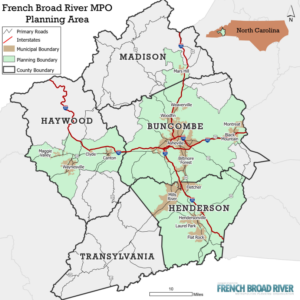The French Broad River Metropolitan Planning Organization (FBRMPO) is a partnership between local and state government that makes decisions about transportation planning in urbanized areas and meets planning requirements established by federal authorizing legislation for transportation funding. In addition, FBRMPO is required to prepare long range transportation plans for the planning area with a minimum 20-year horizon. Additional tasks include developing an annual planning work program and assistance in prioritization of projects to be included in the State Transportation Improvement Program (NCDOT’s funding for a 10-year period). FBRMPO was created in 1962 as the region centered around Asheville continued to experience growth and reached a population density threshold of 50,000 which constitutes the federally-mandated creation of a Metropolitan Planning Organization (MPO). The MPO currently serves over 414,000 people across 21 municipalities.
Below is a visual 2 page overview of what the MPO works on and who it serves. Keep scrolling for more background on each item. If you want more information on the many acronyms and terms used throughout transportation planning, there is a glossary available here.
Planning Area
Local governments in the MPO planning area include: Buncombe, Haywood, Henderson, and Madison Counties, and the municipalities of Asheville, Biltmore Forest, Black Mountain, Canton, Clyde, Flat Rock, Fletcher, Hendersonville, Laurel Park, Maggie Valley, Mars Hill, Mills River, Montreat, Waynesville, Weaverville, and Woodfin

View a .pdf version of our planning area map
FBRMPO Board
The body of local officials that provides policy direction and approval for all FBRMPO projects and proposals is the Board, previously referred to as the Transportation Advisory Committee (TAC). The current voting Board membership is as follows:
- Two members of the Asheville City Council;
- Two members of the Buncombe County Commission;
- Two members of the Haywood County Commission;
- Two members of the Henderson County Commission;
- One member of the Madison County Commission;
- One member of the Black Mountain Board of Aldermen;
- One member of the Biltmore Forest Board of Commissioners;
- One member of the Town of Canton Council;
- One member of the Town of Clyde Council;
- One member of the Village of Flat Rock Village Council
- One member of the Town of Fletcher Town Council;
- One member of the City of Hendersonville City Council;
- One member of the Town of Laurel Park Town Council;
- One member of the Town of Maggie Valley Town Council;
- One member of the Mars Hill Board of Aldermen;
- One member of the Town of Mills River Town Council;
- One member of the Montreat Board of Commissioners;
- One member of the Town of Waynesville Town Council;
- One member of the Weaverville Town Council;
- One member of the Woodfin Board of Aldermen;
- One Division 13 Representative of the North Carolina Board of Transportation;
- One Division 14 Representative of the North Carolina Board of Transportation;
The following are current non-voting members of the Board:
- Federal Highway Administration (North Carolina Division Administrator)
- One member of the Transylvania County Commission
FBRMPO Technical Coordinating Committee (TCC)
The members of the TCC are staff representatives from the 21 local governments, staff from NCDOT, and representatives of other local transportation and planning agencies. The committee makes recommendations to the Board in collaboration with FBRMPO staff but does not take final action.
FBRMPO Responsibilities
The FBRMPO is required to complete the transportation planning process in a continuing, cooperative, and comprehensive (3C) manner. To accomplish these goals, the FBRMPO coordinates TCC and Board activities, completes a Unified Planning Work Program (UPWP), reviews and approves the Metropolitan Transportation Improvement Program, adopts a Metropolitan Transportation Plan and Comprehensive Transportation Plan, and establishes goals and objectives for the transportation planning process. This often includes funding special studies for member governments using federal funds. This introductory presentation gives an overview of what MPOs do and how the French Broad River MPO functions.
Unified Planning Work Program
The Unified Planning Work Program (UPWP) is a framework for the planning activities and efforts that the French Broad River MPO will undertake during a fiscal year. Serving as both a budget and guide, the UPWP is adopted on an annual basis in accordance with Federal Highway Administration (FHWA) and Federal Transit Administration (FTA) guidelines. The UPWP illustrates the funding allocations from federal transportation planning funds, including highway and transit programs. The FBRMPO UPWP includes special studies scheduled to take place during the fiscal year.
Transportation Improvement Program (TIP)
The Transportation Improvement Program (TIP) is a ten-year, multi-modal funding program that identifies transportation improvements recommended for the upcoming period. It identifies projects, groups improvements into staging periods, includes estimated costs and revenues, and is fiscally-constrained. The TIP is part of the Statewide Transportation Improvement Program (STIP) produced by NCDOT, but requires final approval from the FBRMPO Board.
Metropolitan Transportation Plan (MTP)
Federal law requires the FBRMPO to adopt a Metropolitan Transportation Plan (MTP) that is multi-modal, fiscally-constrained, has a minimum 20-year planning horizon, adheres to the adopted public involvement policy, and uses growth forecasts consistent with latest local land use plans. The MTP must be updated every 5 years. The MTP also defines which projects can be programmed into the TIP. The current MTP, MTP 2040 was originally adopted in September 2015 with amendments in May 2018.
Organizational Documents
Found under the Governance Policies page.
